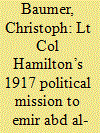| Srl | Item |
| 1 |
ID:
140183


|
|
|
|
|
| Summary/Abstract |
This address asks how we got to today’s politics in America; a politics of polarized political parties engaged in close political competition in a system of checks and balances. The result has often been divided control of government and an apparent inability to address major political problems. This address develops the historical foundation for these characteristics. Historically, the Founding period set the stage of separated powers and the first party system. America developed a market economy, a middle class, and a mass-based set of parties in the Antebellum period. Through the Progressive era, nation-wide reforms led to a more democratic but increasingly candidate-centered politics in the North, and the establishment of Jim Crow politics in the South. The post-War period saw the full development of candidate-centered elections. While the breakup of Jim Crow due to the Civil Rights and Voting Rights Acts in the mid-1960s ended Jim Crow and made possible a competitive party system in the South, the later was delayed until the full implementation of the Republican’s “southern strategy” in 1980 and beyond. This set in motion the partisan polarization of today, to combine with separated powers to create what many refer to as the “current” political “dysfunction.”
|
|
|
|
|
|
|
|
|
|
|
|
|
|
|
|
| 2 |
ID:
165483


|
|
|
|
|
| Summary/Abstract |
This article explores how the musical Hamilton can be used as a way to bring students to a new understanding of American government at the introductory level. As a recent pop-culture smash, Hamilton has brought to the fore the possibility of a new civic conversation about our political beginnings. With many citizens lacking a sufficient understanding of American political culture at this fraught time, the introductory American government course is the ideal place to enhance civic understanding. This article discusses how music from the Hamilton cast album, as well as videos about the show, were used during two semesters of the introductory American government course at a regional public university. Doing so encouraged discussion and active learning about key concepts and critical moments in American history that have shaped politics through the present day.
|
|
|
|
|
|
|
|
|
|
|
|
|
|
|
|
| 3 |
ID:
179343


|
|
|
|
|
| Summary/Abstract |
This article is an account of the political mission of Lt Col Robert Edward Archibald Hamilton (later Udny-Hamilton, 11th Lord Belhaven and Stenton, 1871–1950) to the Emir Abd Al-Aziz Al-Saud of Najd in 1917. It particularly draws on Hamilton's private diaries, as well as other reports and notes as well as on Philby's Report on Najd Mission 1917–1918. It contains an account of the political and military background to the mission in the Arab world and Mesopotamia in the context of the First World War, including Ibn Saud's relationships with the Ottomans, Kuwait, the British, Sharif Hussain, and the Ajman tribe. It also contains further biographical information about Hamilton.
|
|
|
|
|
|
|
|
|
|
|
|
|
|
|
|